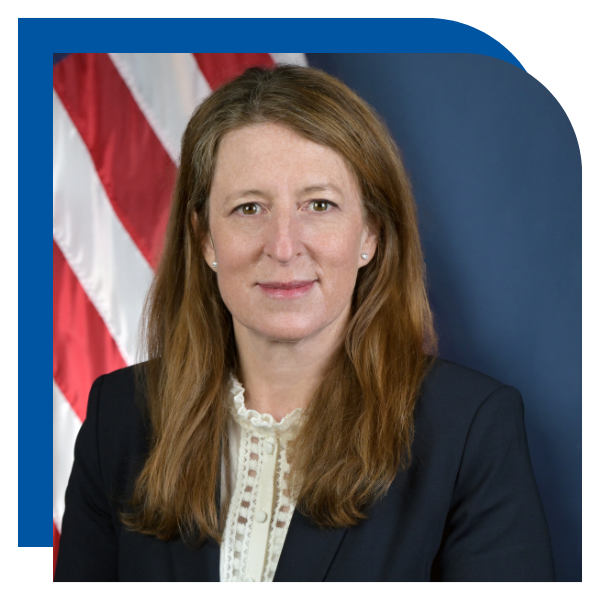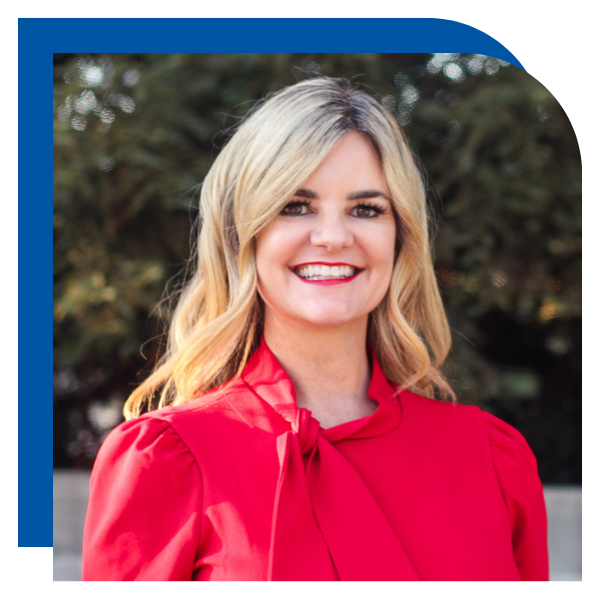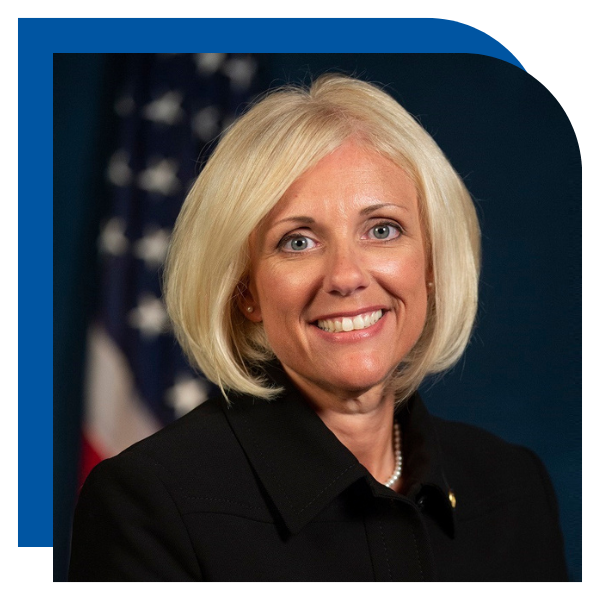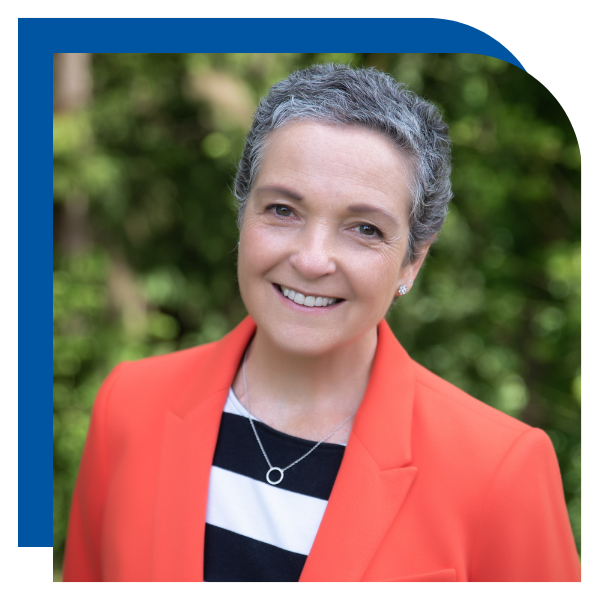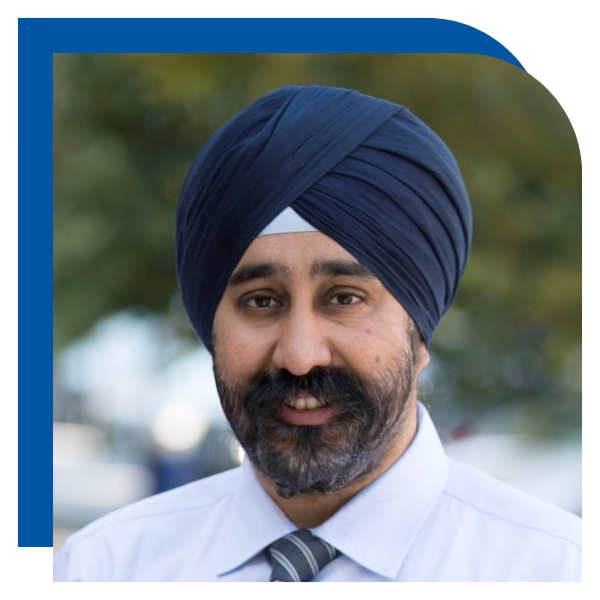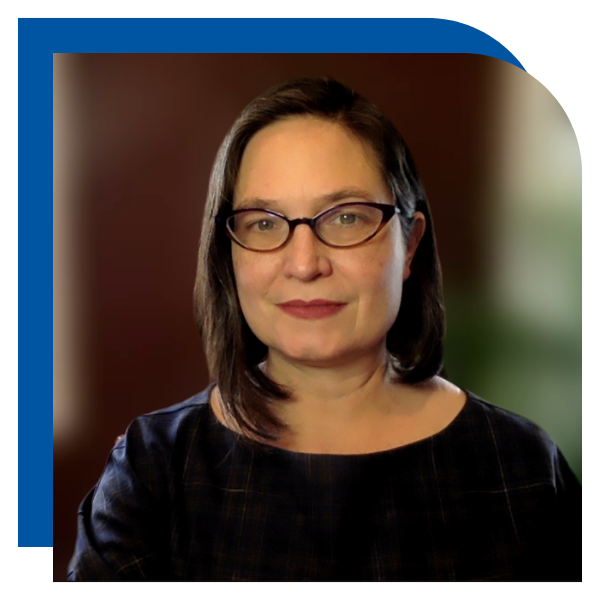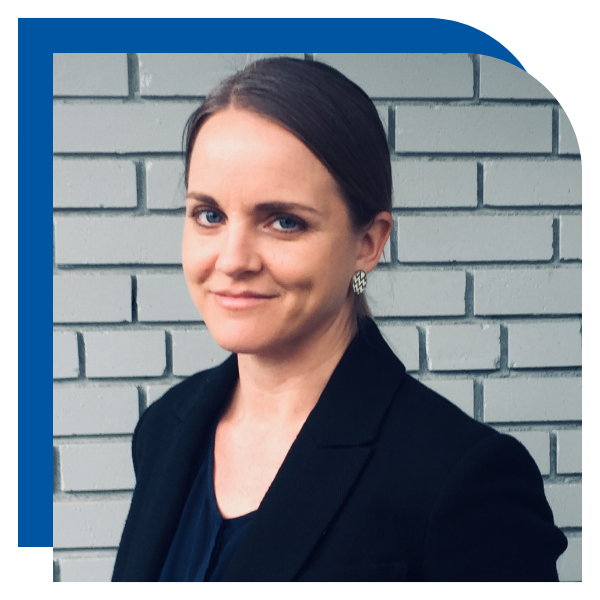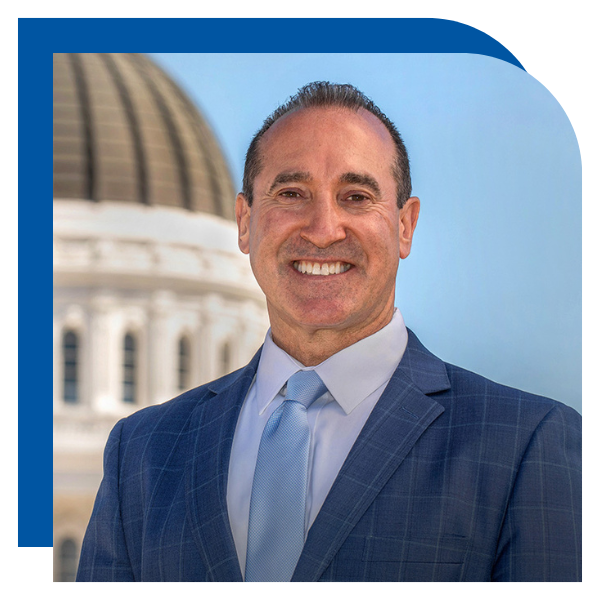- 408-924-7560
- mineta-institute@sjsu.edu
- Donate
Past Webinars
MTI organizes or participates in several transportation-related webinars each year. You can find leading transportation experts at all of these webinars, making them an excellent resource for professional and research insights.
| Dates | Events | ||||||||||||||||||||||||||||||||||||||||||||||||||
|---|---|---|---|---|---|---|---|---|---|---|---|---|---|---|---|---|---|---|---|---|---|---|---|---|---|---|---|---|---|---|---|---|---|---|---|---|---|---|---|---|---|---|---|---|---|---|---|---|---|---|---|
January 26, 2024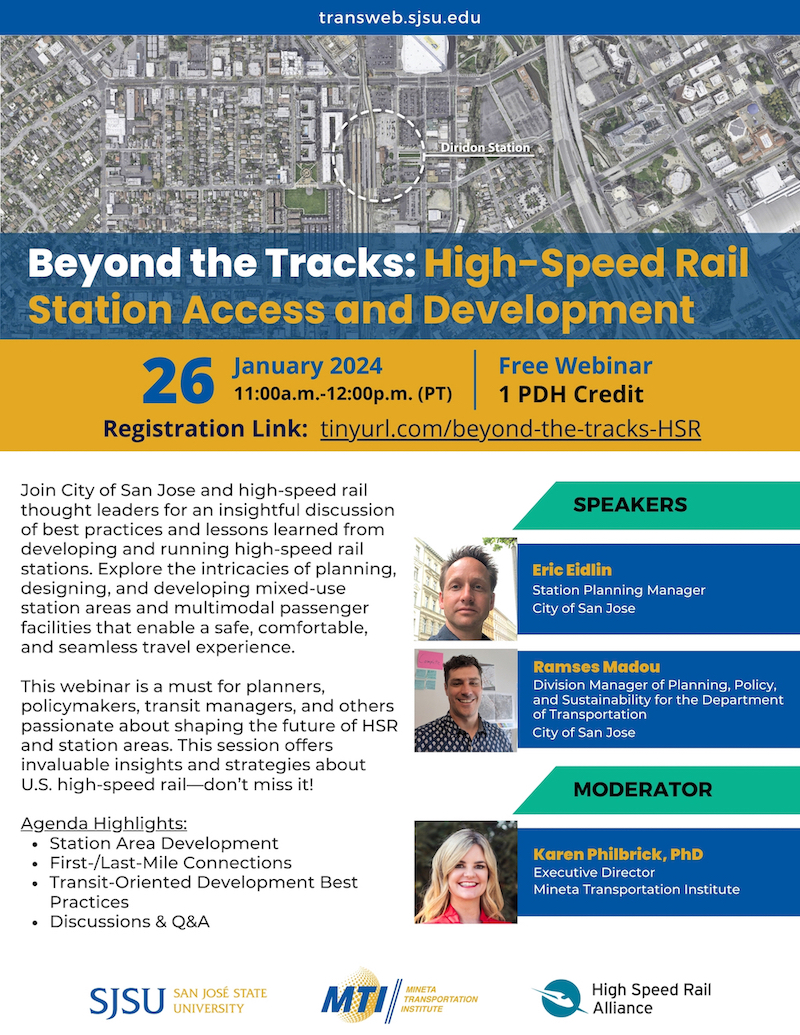 |
Beyond the Tracks: High-Speed Rail Station Access and Development *This event was co-sponsored by High Speed Rail Alliance. The City of San Jose and high-speed rail thought leaders discussed best practices and lessons learned from developing and running high-speed rail stations. They also explored the intricacies of planning, designing, and developing mixed-use station areas and multimodal passenger facilities that enable a safe, comfortable, and seamless travel experience. This webinar was created for planners, policymakers, transit managers, and others passionate about shaping the future of HSR and station areas. Agenda Highlights:
Speakers:
Moderator: Karen Philbrick, PhD, Executive Director, Mineta Transportation Institute (MTI) PDH CertificateView Recording |
||||||||||||||||||||||||||||||||||||||||||||||||||
November 8, 2023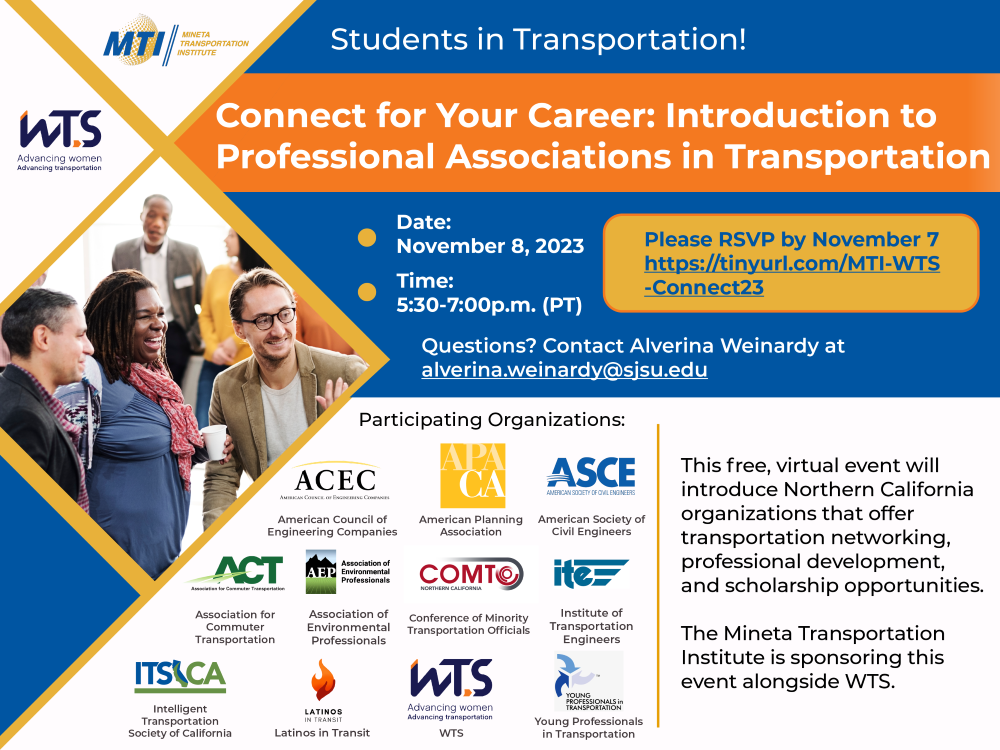 |
Connect for Your Career: An Introduction to Professional Associations in Transportation - Online WTS-SF Bay Area and the Mineta Transportation Institute (MTI) of San Jose State hosted this free virtual event "Connect for Your Career: An Introduction to Professional Associations in Transportation" that introduced university students and emerging professionals to Northern California transportation organizations that offer networking, professional development opportunities, and/or scholarship opportunities. Participating organizations include:
View Slides.View Recording. |
||||||||||||||||||||||||||||||||||||||||||||||||||
October 31, 2023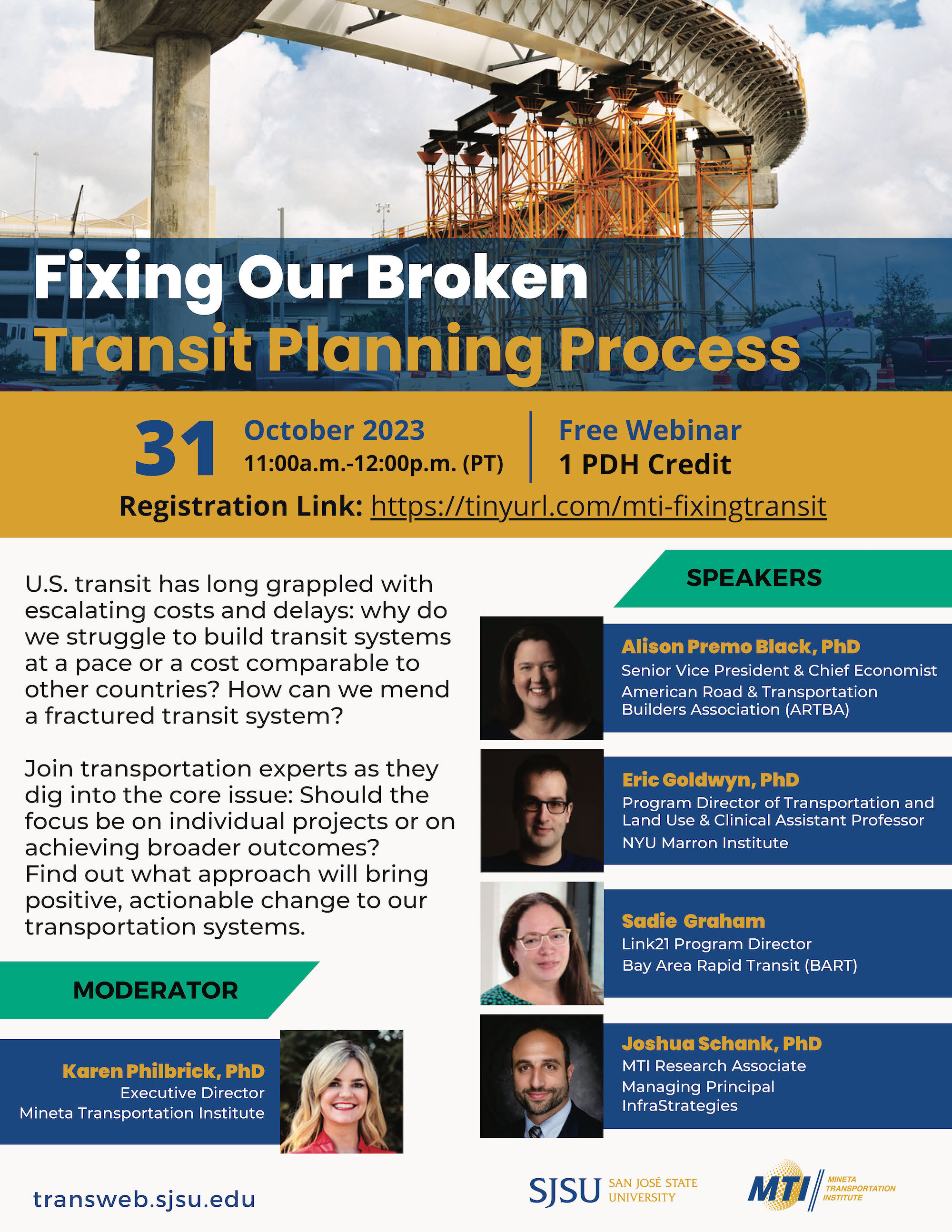 |
Fixing Our Broken Transit Planning Process - Online U.S. transit has long grappled with escalating costs and delays: why do we struggle to build transit systems at a pace or a cost comparable to other countries? How can we mend a fractured transit system? In this webinar, transportation experts discussed the core issue: Should the focus be on individual projects or on achieving broader outcomes? Attendees learned what approach will bring positive, actionable change to our transportation systems. Speakers:
Moderator: Hilary Nixon, PhD, Deputy Executive Director, Mineta Transportation Institute (MTI) View Recording.View & Download PDH Certificate. |
||||||||||||||||||||||||||||||||||||||||||||||||||
October 24, 2023 to October 26, 2023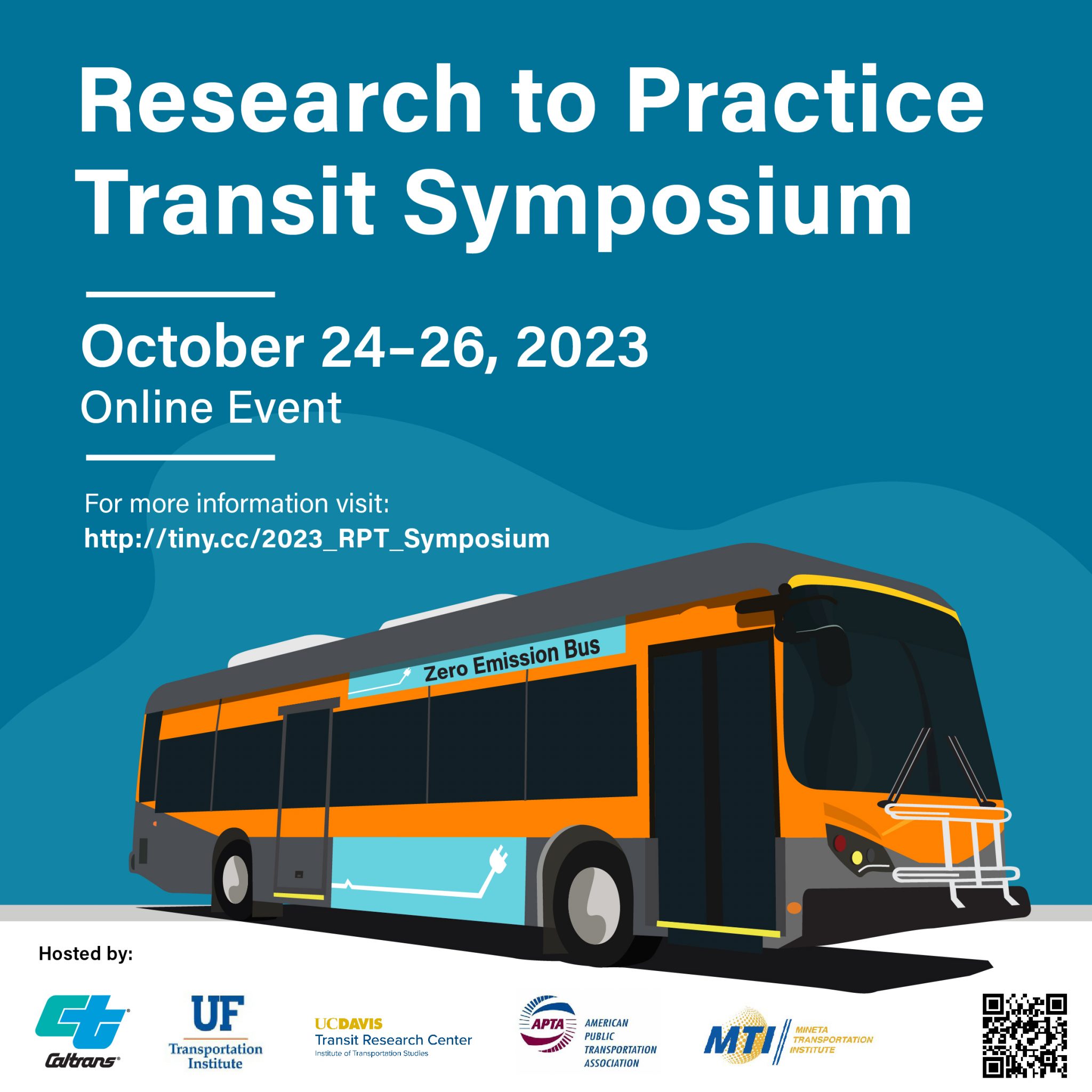 |
2023 “Research to Practice” Transit Symposium - Online As the transit industry is poised to take advantage of the largest transit and rail investment in our lifetimes, the symposium provides a platform where transit experts share insights on how evidence-based research is being or can be, used to make the most of these opportunities in a changing environment. This year’s symposium focused on the following topics:
The Symposium was convened by a partnership between APTA, California Department of Transportation (Caltrans), University of Florida Transportation Institute, the T-SCORE University Transportation Center, and the Mineta Transportation Institute. |
||||||||||||||||||||||||||||||||||||||||||||||||||
September 26, 2023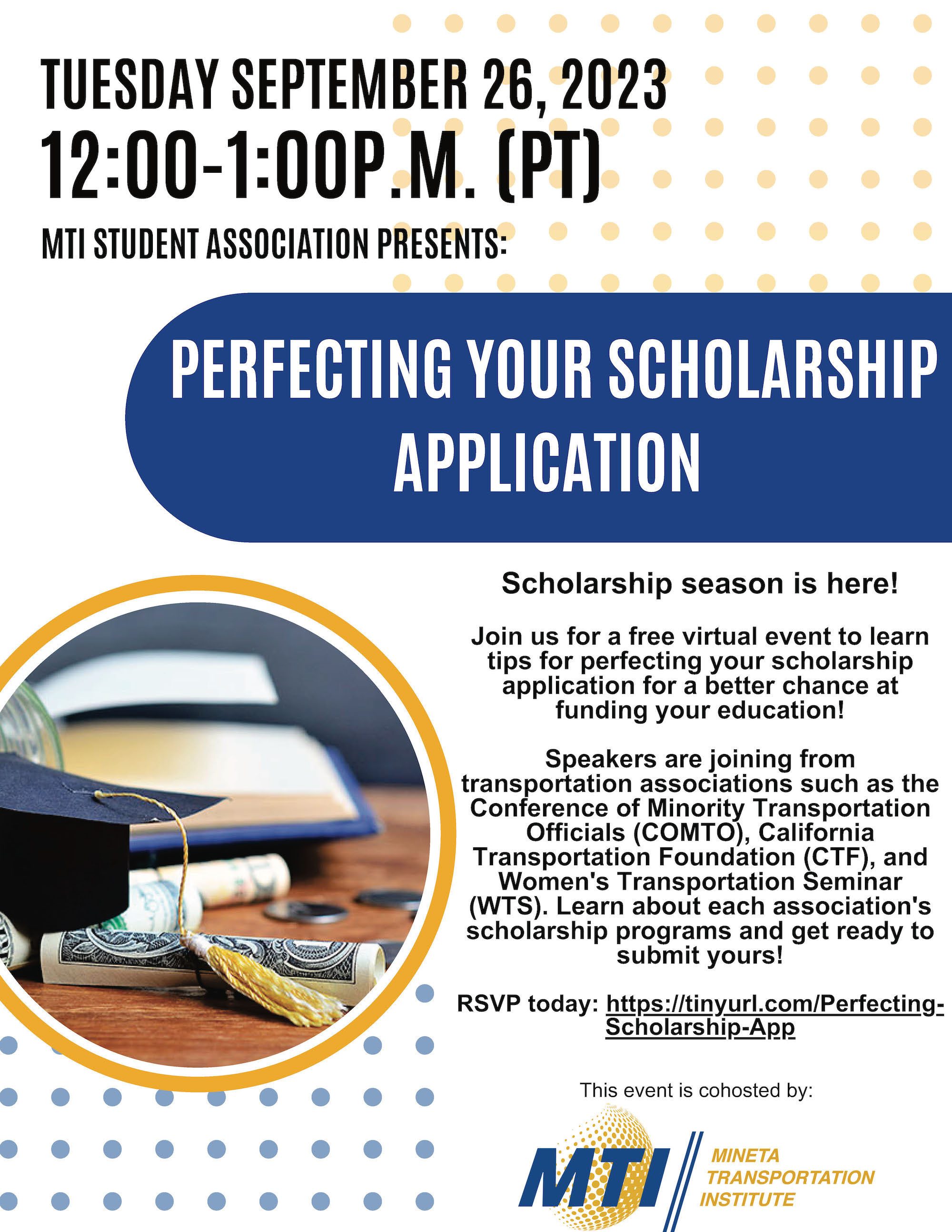 |
Perfecting Your Scholarship Application - Online Scholarship season is here! MTI Student Association hosted a free virtual event to learn tips for perfecting students' scholarship applications for a better chance at funding their education. Speakers joined from transportation associations such as the Conference of Minority Transportation Officials (COMTO), California Transportation Foundation (CTF), and Women's Transportation Seminar (WTS). Attendees learned about each association's scholarship programs. *MTI was a proud co-sponsor of this event. View Recording. |
||||||||||||||||||||||||||||||||||||||||||||||||||
September 20, 2023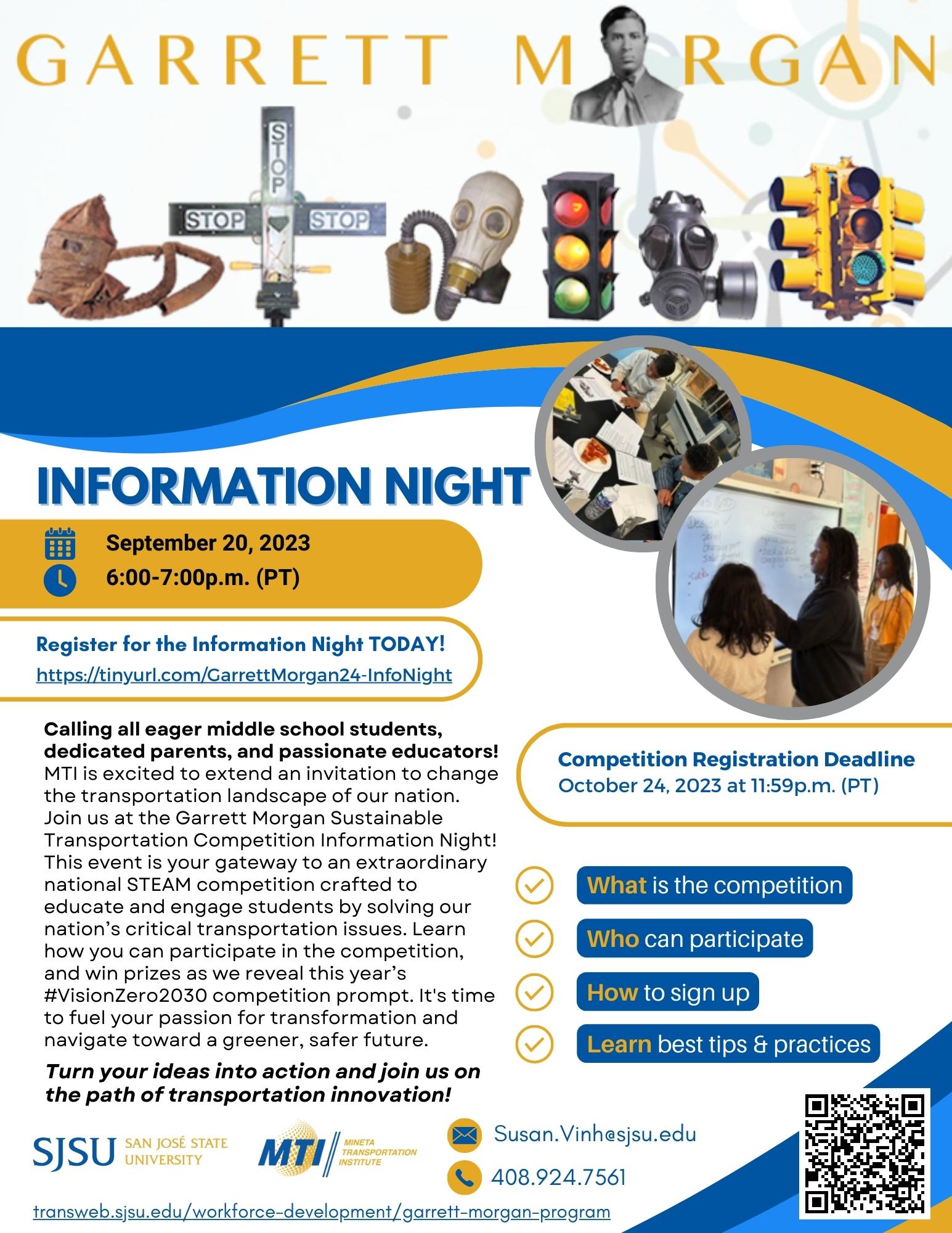 |
Garrett Morgan Sustainable Transportation Competition: Information Night MTI was joined by eager middle school students, dedicated parents, and passionate educators at the Garrett Morgan Sustainable Transportation Competition Information Night. This event served as a gateway to an extraordinary national STEAM competition crafted to educate and engage students by solving our nation’s critical transportation issues. Participants learned how they can participate in the competition, and win prizes as we revealed this year’s #VisionZero2030 competition prompt. Learn more about the competition: https://transweb.sjsu.edu/workforce-development/garrett-morgan-program View the Recording.View the Slide Deck.View the 2024 Competition Prompt. |
||||||||||||||||||||||||||||||||||||||||||||||||||
June 2, 2023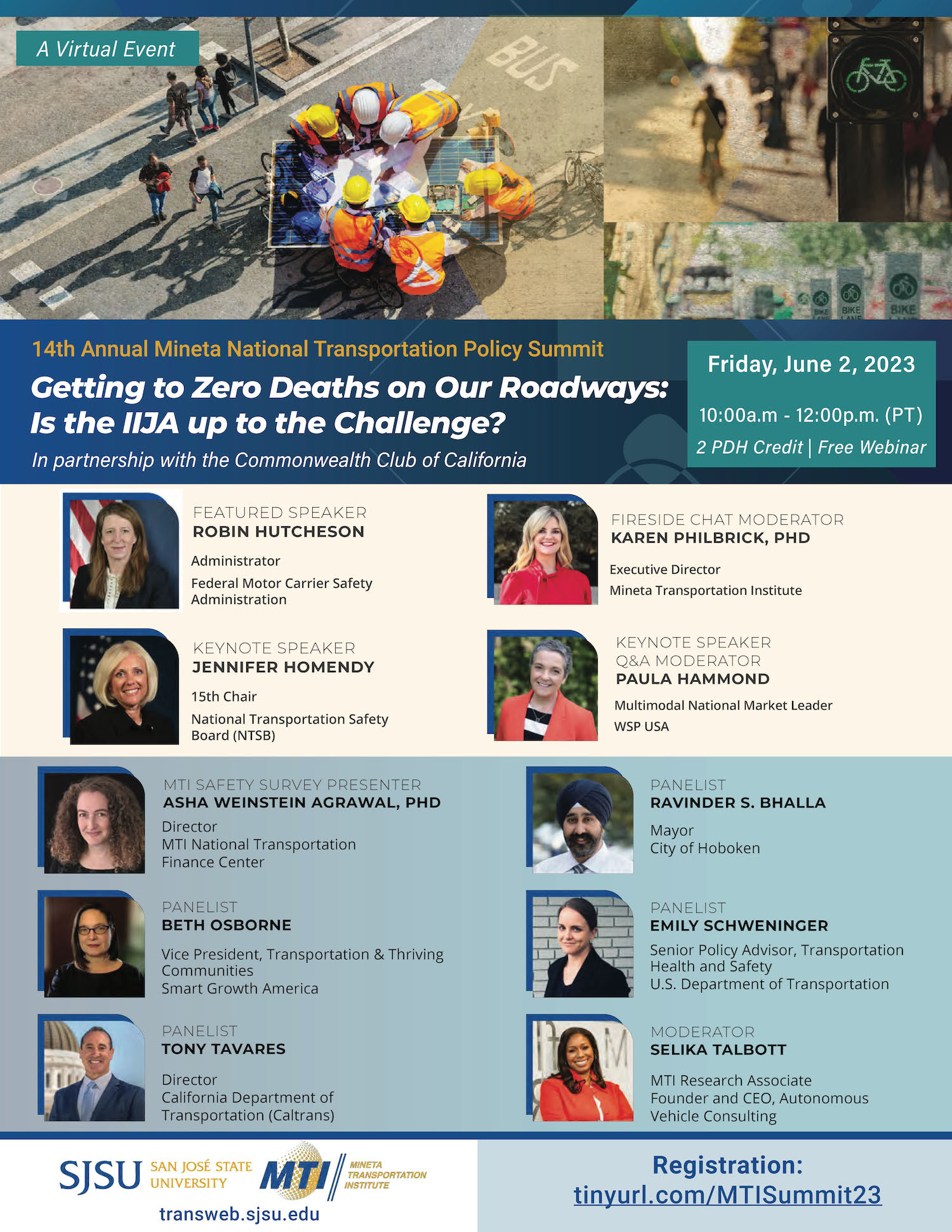 |
Getting to Zero Deaths on Our Roadways: Is the IIJA up to the Challenge? - Online14th Annual Mineta National Transportation Policy SummitThe United States faces a public health crisis on its roads. In 2021 alone, almost 43,000 people died in traffic crashes and millions more suffered serious injuries. Secretary Pete Buttigieg calls the situation a preventable crisis—one for which we must take responsibility by recognizing that human lives are not a price to pay for modernity. New funding available through the 2021 Infrastructure Investment and Jobs Act (IIJA) provides a significant opportunity to reduce crashes through infrastructure redesign. The Mineta Transportation Institute and a panel of national experts discussed the role of infrastructure redesign in achieving a national goal of zero traffic fatalities. See here for more information and recordings from past events in the series. View ProgramView RecordingView & Download PDH CreditCM Credit
|
||||||||||||||||||||||||||||||||||||||||||||||||||
May 25, 2023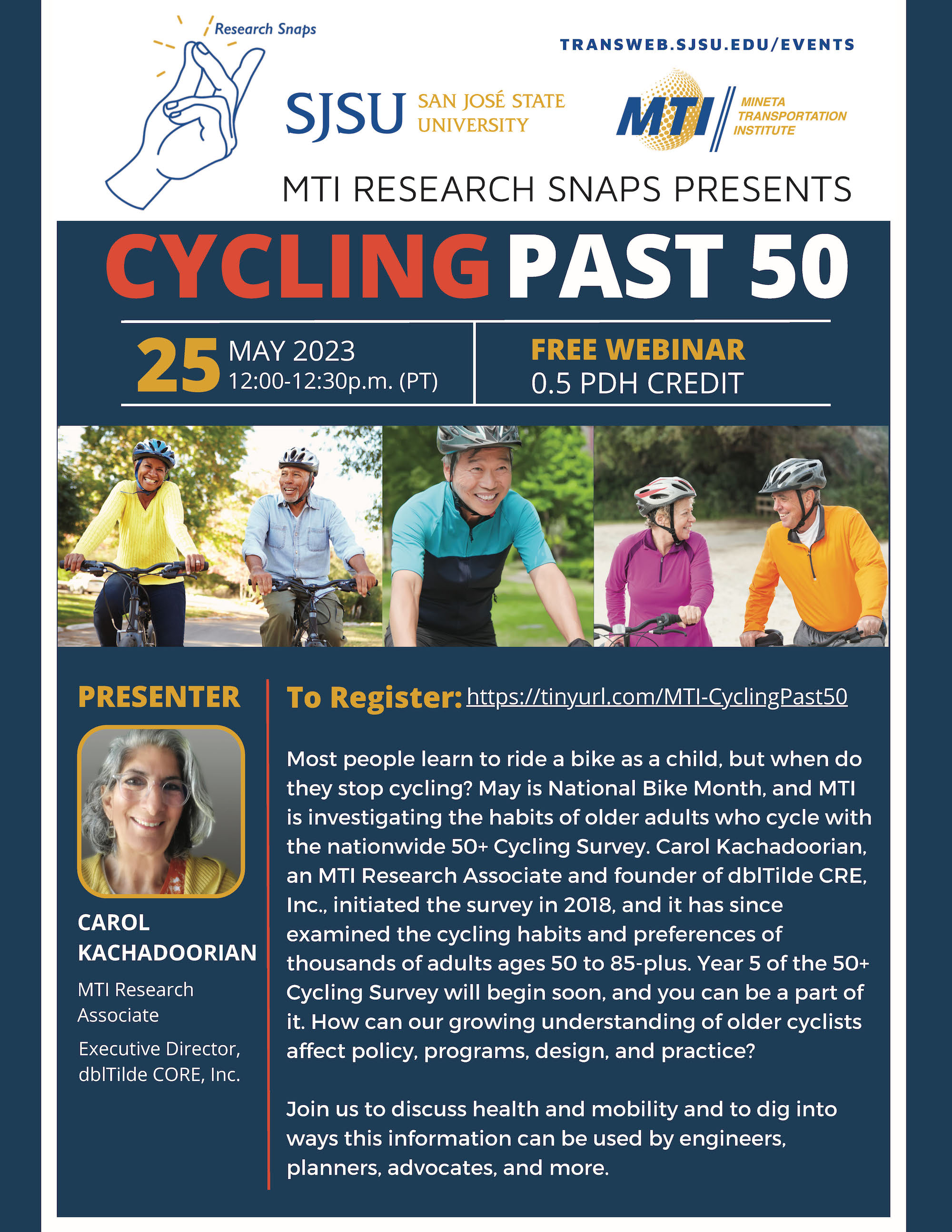 |
Cycling Past 50 - Online Most people learn to ride a bike as a child, but when do they stop cycling? May is National Bike Month, and MTI is investigating the habits of older adults who cycle with the nationwide 50+ Cycling Survey. Carol Kachadoorian, an MTI Research Associate and founder of dblTilde CRE, Inc., initiated the survey in 2018, and it has since examined the cycling habits and preferences of thousands of adults ages 50 to 85-plus. Year 5 of the 50+ Cycling Survey will begin soon, and you can be a part of it. How can our growing understanding of older cyclists affect policy, programs, design, and practice? Join us to discuss health and mobility and to dig into ways this information can be used by engineers, planners, advocates, and more. *0.5 PDH credit available View & Download PDH CertificateView RecordingView Slide DeckAbout the PanelistCarol KachadoorianMTI Research Associate; Executive Director, dblTilde CORE, Inc.Carol has a breadth of knowledge of and expertise in transportation planning and operations, working at both the city and regional levels, including school- and community-based active transportation plans and older adult mobility. She recognizes the importance of both big data and personal experience to determine feasible changes that make travel by all modes safe, accessible, and comfortable for all ages and abilities. Carol has spoken nationally and regionally on the need to revise long-standing perceptions of older adults through words and images. She developed a typology of older adults’ physical activity levels that can help encourage mobility and wellness. The Mineta Transportation Institute published her pioneering work, Cycling past 50: A Closer Look into the World of Older Cyclists, and hosted the 50+ Cycling Survey Year 4. Results from the survey will be available in the Fall 2023. |
||||||||||||||||||||||||||||||||||||||||||||||||||
May 18, 2023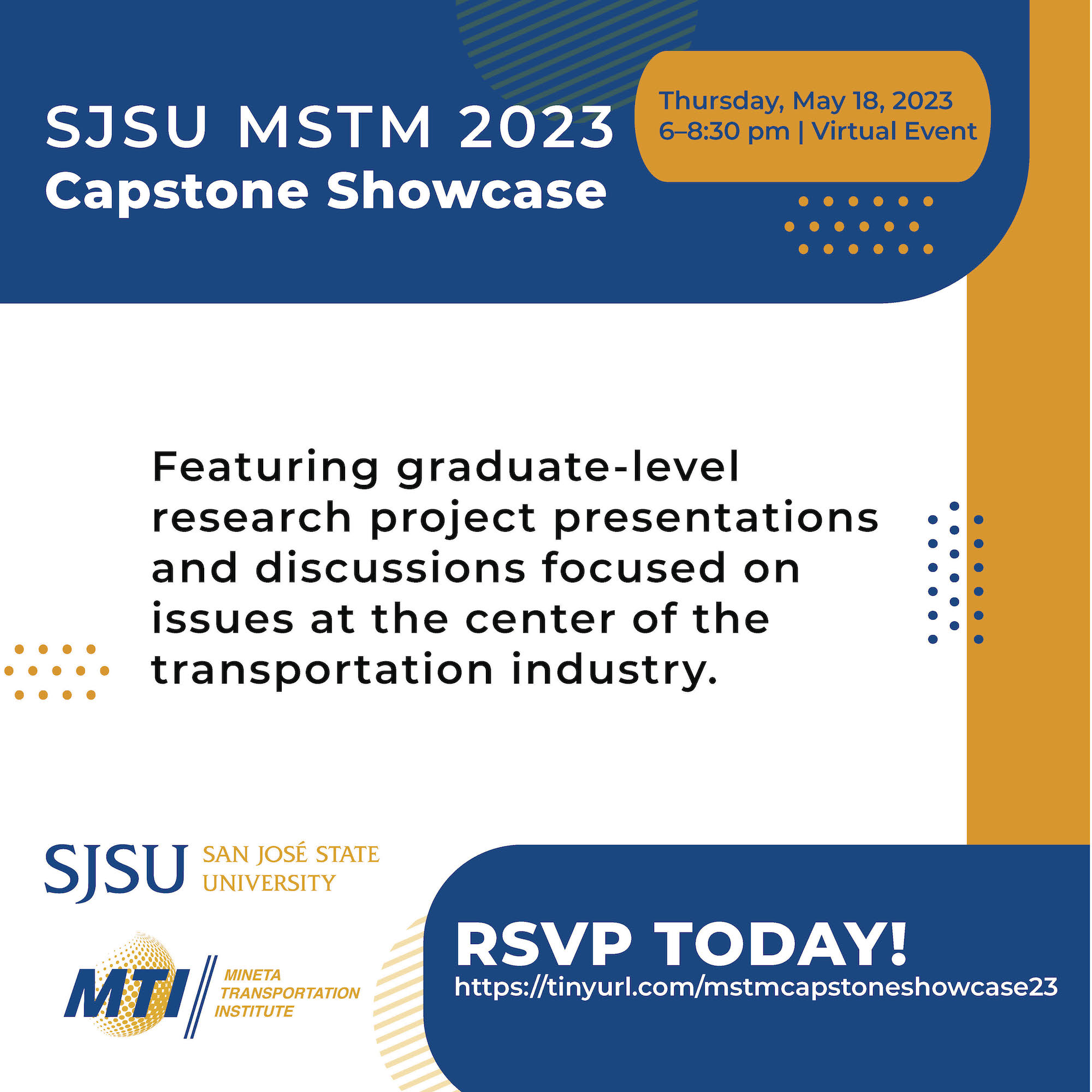 |
2023 MSTM Capstone Showcase - Online Students from the Master of Science in Transportation Management program at San José State University presented their final capstone research projects. This interactive event provided opportunities to meet with the students and learn about their research and key issues in the field of transportation. |
||||||||||||||||||||||||||||||||||||||||||||||||||
April 28, 2023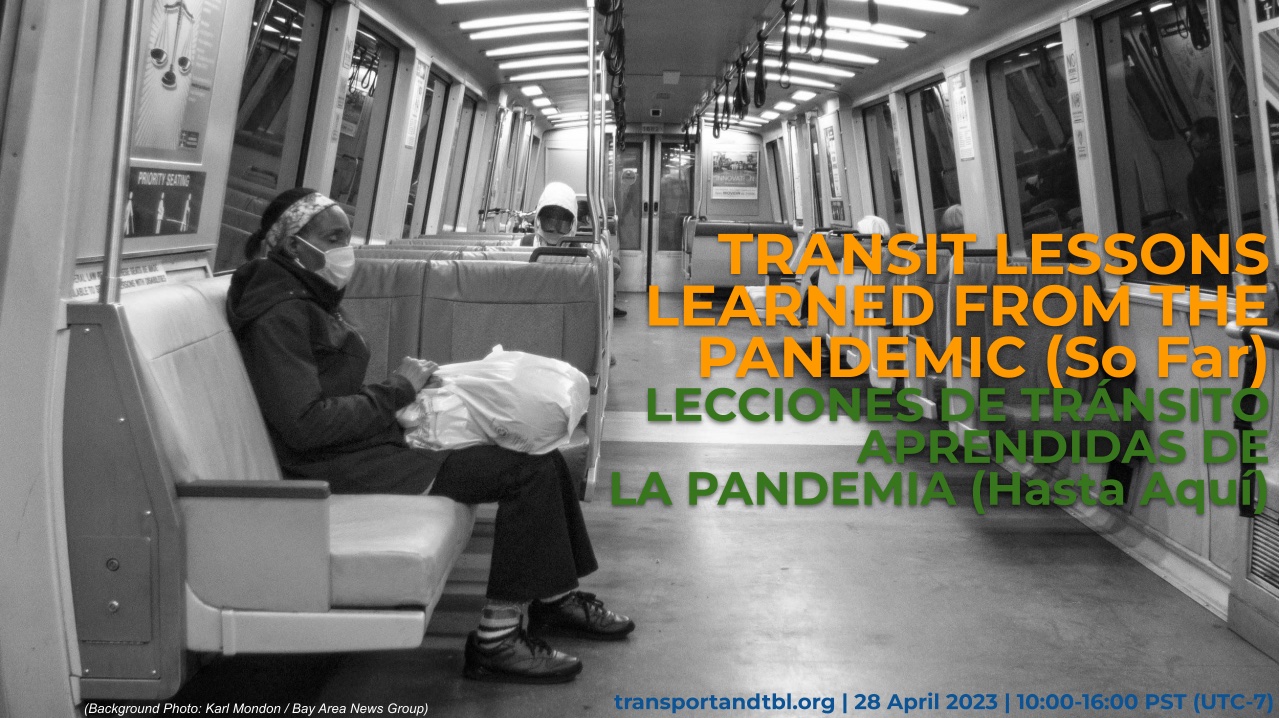 |
Transport and the Triple Bottom Line Summit 2023: Transit Lessons Learned from the Pandemic (So Far) - Online The Transport and the Triple Bottom Line Summit sought to explore the concept of 'sustainable transport,' leaving attendees with a fuller understanding, and most importantly, a definition for the term. Panelists and speakers included an array of national experts, practitioners, and scholars on social equity and transport, the environmental impact of transport, financial mechanisms for secure and continuous operations, as well as, decision-makers currently involved in California's notable public-private partnerships. Further, conference panelists included leaders in the advocacy, public, private, P3, and nonprofit sectors. Integrating existing discourse and studies on sustainability and Elkington's and Savitz's Triple Bottom Line, attendees leave with a holistic and objective definition of sustainable transport, allowing all parties the ability to confidently and equally assess and explain such transport. View Agenda*MTI was a proud co-sponsor of this event. |
||||||||||||||||||||||||||||||||||||||||||||||||||
April 27, 2023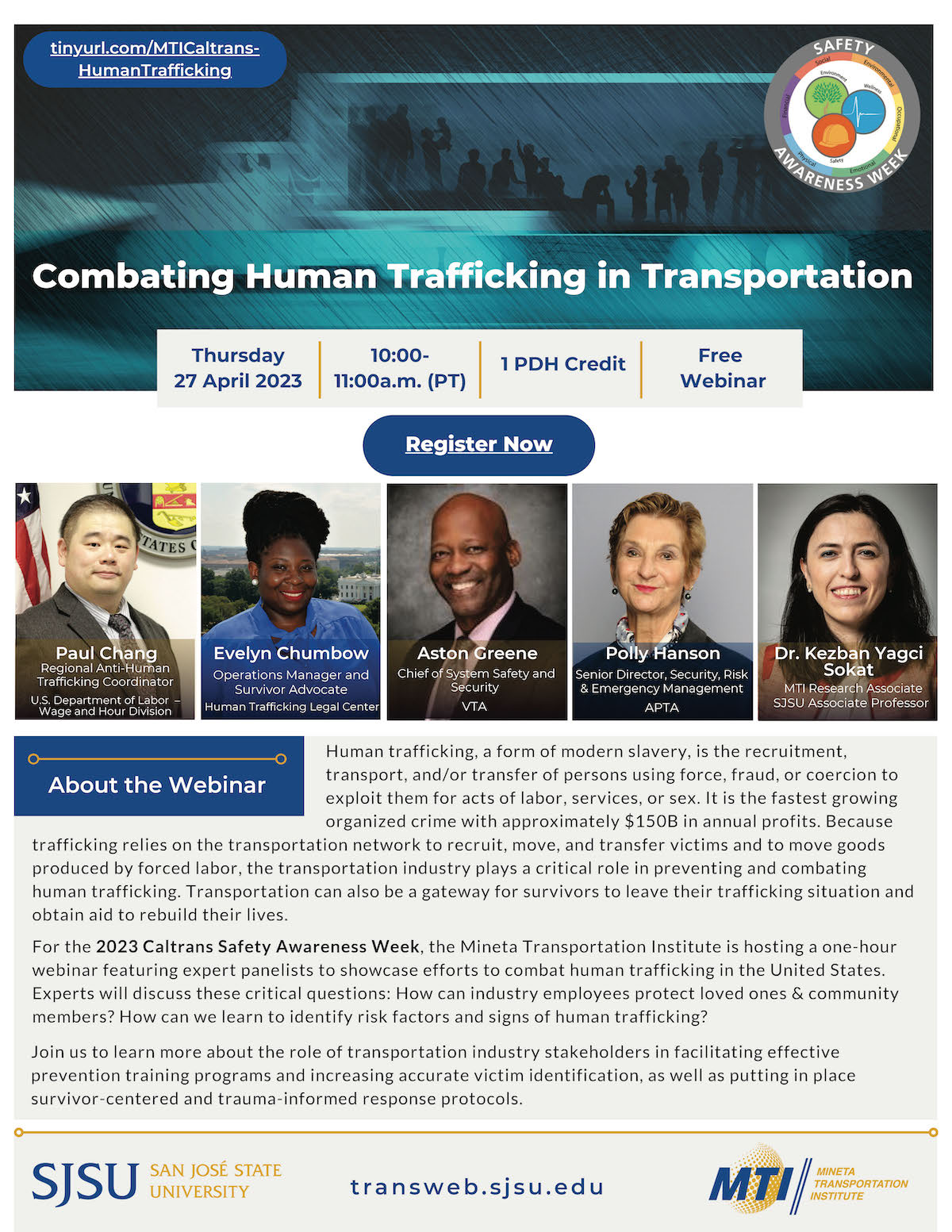 |
Combating Human Trafficking in Transportation (2023 Caltrans Safety Awareness Week) - Online Human trafficking, a form of modern slavery, is the recruitment, transport, and/or transfer of persons using force, fraud, or coercion to exploit them for acts of labor, services, or sex. It is the fastest growing organized crime with approximately $150B in annual profits. Because trafficking relies on the transportation network to recruit, move, and transfer victims and to move goods produced by forced labor, the transportation industry plays a critical role in preventing and combating human trafficking. Transportation can also be a gateway for survivors to leave their trafficking situation and obtain aid to rebuild their lives. For 2023 Caltrans Safety Awareness Week, the Mineta Transportation Institute hosted a one-hour webinar featuring expert panelists to showcase efforts to combat human trafficking in the United States. Experts discussed these critical questions: How can industry employees protect loved ones & our community? How can we learn to identify risk factors and signs of human trafficking when in the transportation system? Watch the recording to learn more about the role of transportation industry stakeholders in facilitating effective prevention training programs and increasing accurate victim identification, as well as putting in place survivor-centered and trauma-informed response protocols. View the RecordingView the List of ResourcesView & Download PDH CertificateAbout the Panelists
Paul Chang serves as the Regional Anti-Human Trafficking Coordinator at the U.S. Department of Labor – Wage and Hour Division. In his 28+ years with the agency, Paul worked on some of the most celebrated cases as an investigator and Assistant District Director. He developed numerous training materials and programs, including the Enterprise Model that focuses on strategic approaches to prosecution, protection, and prevention of forced labor. Paul served as the National Co-Chair of the White House Initiative on Asian Americans Native Hawaiians and Pacific Islanders (WHIAANHPI) Regional Network. Paul is also a lecturer at Cal State LA’s MPA program and Vanguard University on Human Trafficking. He is the recipient of numerous Secretary’s Awards and community honors, including the 2019 Global Center for Women and Justice Diamond Award.
Evelyn Chumbow is a survivor of child labor trafficking turned anti-trafficking activist and public speaker. Chumbow has been invited to brief several government agencies about human trafficking from a survivor’s perspective, including the Department of Homeland Security, the FBI, the State Department, and the Department of Justice. She was appointed by President Obama to serve on the U.S. Advisory Council on Human Trafficking. She has been invited as a speaker to international events and has been awarded many honors for her work. Chumbow serves as an advisor to human trafficking NGOs and on the Board of Directors for Free the Slaves. Chumbow hopes to leverage her unique position as a former child slave to end human trafficking in her hometown and globally.
Polly Hanson coordinates with APTA stakeholders to develop transit security, risk and emergency management standards and policies. She serves as the Vice-chair of the TSA Surface Transportation Security Advisory Committee. Previously Ms. Hanson was the Chief of Police for AMTRAK, where she led a national police department responsible for protecting over 30 million passengers and 20,000 employees. Additionally, as the Chief of the Metro Transit Police in D.C., she led a tristate police department and directed the response to the terrorist attacks in Madrid and London. She received WMATA’s Carmen E. Turner Award, and the Conference of Minority Transportation Officials (COMTO) named Ms. Hanson a “Woman Who Moves the Nation.” Ms. Hanson is a member of the Operation Lifesaver, Inc Board of Directors.
Dr. Yagci Sokat is an Assistant Professor of Business Analytics at San José State University and a Research Associate at the Mineta Transportation Institute with a passion for using analytics to alleviate human suffering in the areas of public health, humanitarian logistics, and human trafficking. Supported by the United States Department of Transportation, IBM, Valley Transportation Authority and San José State University, she has led various multi-disciplinary anti-trafficking projects and has served on several local anti-trafficking committees. She received her PhD in Industrial Engineering and Management Sciences from Northwestern University and holds master’s degrees from Georgia Institute of Technology with a Fulbright scholarship. |
||||||||||||||||||||||||||||||||||||||||||||||||||
March 21, 2023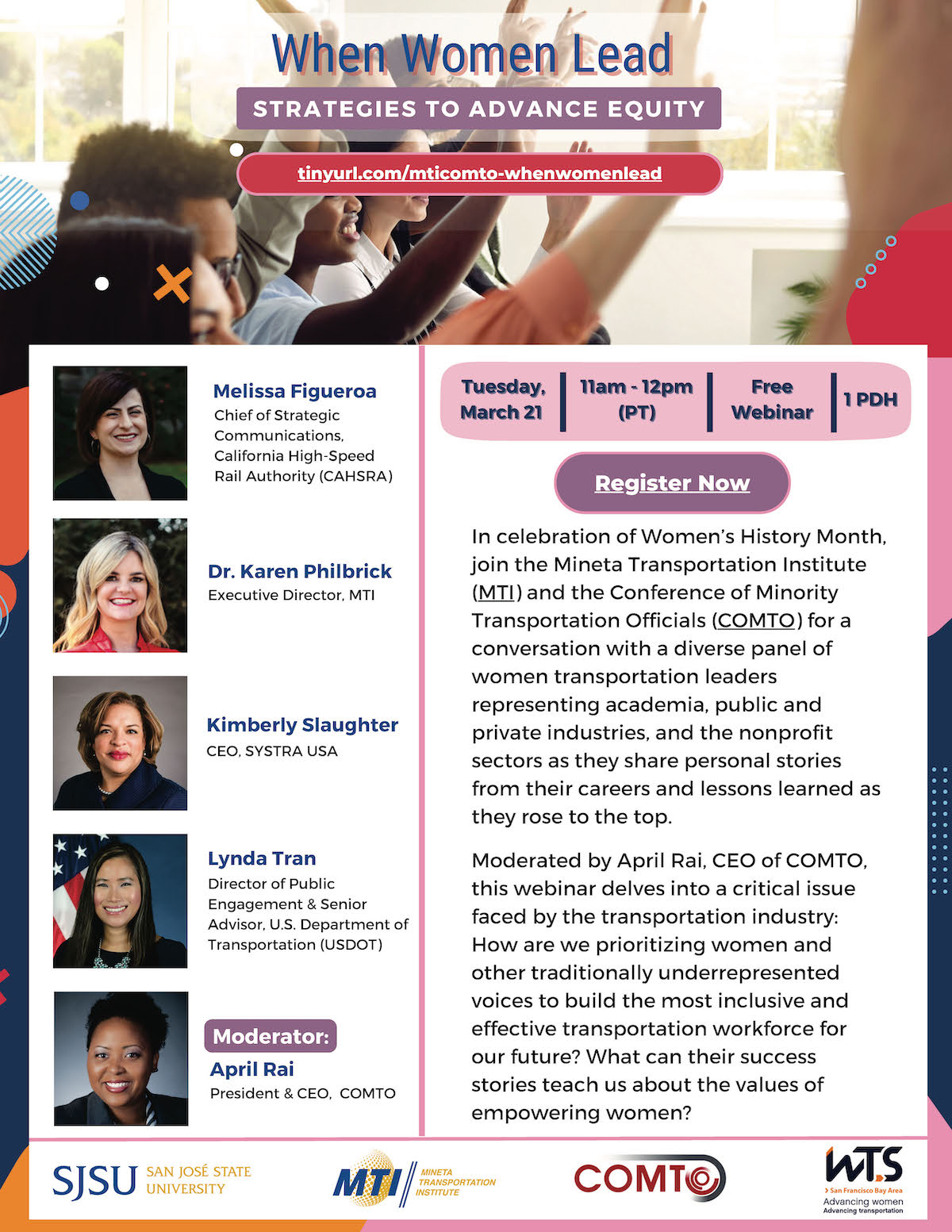 |
When Women Lead: Strategies to Advance Equity In celebration of Women’s History Month, the Mineta Transportation Institute (MTI) and the Conference of Minority Transportation Officials (COMTO) hosted a conversation with a diverse panel of women transportation leaders representing academia, public and private industries, and the nonprofit sectors as they shared personal stories from their careers and lessons learned as they rose to the top. Moderated by April Rai, CEO of COMTO and a member of the MTI Board of Trustees, this webinar delved into a critical issue faced by the transportation industry: How are we prioritizing women and other traditionally underrepresented voices to build the most inclusive and effective transportation workforce for our future? What can their success stories teach us about the values of empowering women? Speakers:
Moderator: April Rai, President & CEO, Conference of Minority Transportation Officials (COMTO) This event was co-sponsored by COMTO and WTS San Francisco Bay Area Chapter. PDH CertificateView RecordingAbout the Panelists
As the Chief of Strategic Communications, Melissa oversees the communications branches for media, stakeholder engagement, special projects, and outreach. Melissa previously served as CalSTA’s Deputy Secretary of Communications and Strategic Planning; Deputy Secretary of Communications and External Affairs at the Business, Consumer Services and Housing Agency; and Deputy Secretary of Communications at the State and Consumer Services Agency. Before beginning work in the state’s executive branch, Melissa worked within the Legislature as Press Secretary for California State Senator Joe Simitian. Figueroa graduated from Cal Poly, San Luis Obispo in 2002 with a degree in Journalism. She served as a student representative on the department’s advisory board and now serves on the Cal Poly Journalism Advisory Board.
Karen Philbrick is the executive director of the Mineta Transportation Institute (MTI) at San José State University, a position she has held since 2014. MTI leads three multi university competitively selected consortia: the Mineta Consortium for Transportation Mobility (MCTM) funded by the US Department of Transportation, the California State University Transportation Consortium (CSUTC) funded by the Road Repair and Accountability Act of 2017 (CA Senate Bill 1) and the Climate Change and Extreme Events Training and Research Program funded by the Federal Railroad Administration. Dr. Philbrick has received many prestigious awards for her leadership excellence and outstanding contributions to her field. She received the CUTC Administrative Leadership award, the Conference of Minority Transportation Officials (COMTO) named Dr. Philbrick a “Woman Who Moves the Nation,” the Silicon Valley Business Journal named Dr. Philbrick 1 of the 100 Women of Influence in Silicon Valley.
Kimberly Slaughter has been involved in the development of mobility solutions for over 30 years and has a wealth of experience in the transportation industry, working for planning, architecture/engineering consulting firms and public transportation providers. She is a graduate of the University of Texas in Austin with an MSc in Community and Regional Planning. Kim was appointed to head the American Public Transportation Association’s (APTA) subcommittee for the Mobility Restoration & Recovery Task Force. Kim has also served on the APTA Board of Directors and Business Members Board of Governors, Business Council of the African American Mayors Association, Women’s Transportation Seminar, and Conference of Minority Transportation Officials.
Lynda Tran serves as Director of Public Engagement and Senior Advisor to the Secretary. A longtime organizer and communicator with over two decades experience in policy, advocacy, and campaigns, Lynda returns to DOT after co-founding 270 Strategies, where she developed public engagement strategies for clients across the globe – including the Environmental Defense Fund, Oxfam America, United Way Worldwide, FAMM, the Black Economic Alliance, and the Economic Security Project. Recently, she was a senior strategist for Bill Gates’ Breakthrough Energy and served on the Board of Advisors for Higher Ground Labs and Battleground Texas. A CBS News Political Contributor through the 2020 cycle, she previously led teams for Organizing for America, then-Governor Tim Kaine, and SEIU.
April joined COMTO in December 2021 as President and CEO with nearly 20 years of experience managing private, public sector and non-profit organizations. Previously, April served as Deputy Executive Director for Women’s Transportation Seminar International (WTS), leading the management of operations, staffing and program management for 65 chapters across North America. Prior to joining WTS, April served as the CEO for the National Organizations for Youth Safety (NOYS), a coalition of over 100 organizations and agencies dedicated to youth health and safety education. April’s current appointments include Board Member, Washington Metropolitan Area Transit Authority (WMATA), Board Member, Mineta Transportation Institute and numerous transportation related advisory boards. |
||||||||||||||||||||||||||||||||||||||||||||||||||
February 28, 2023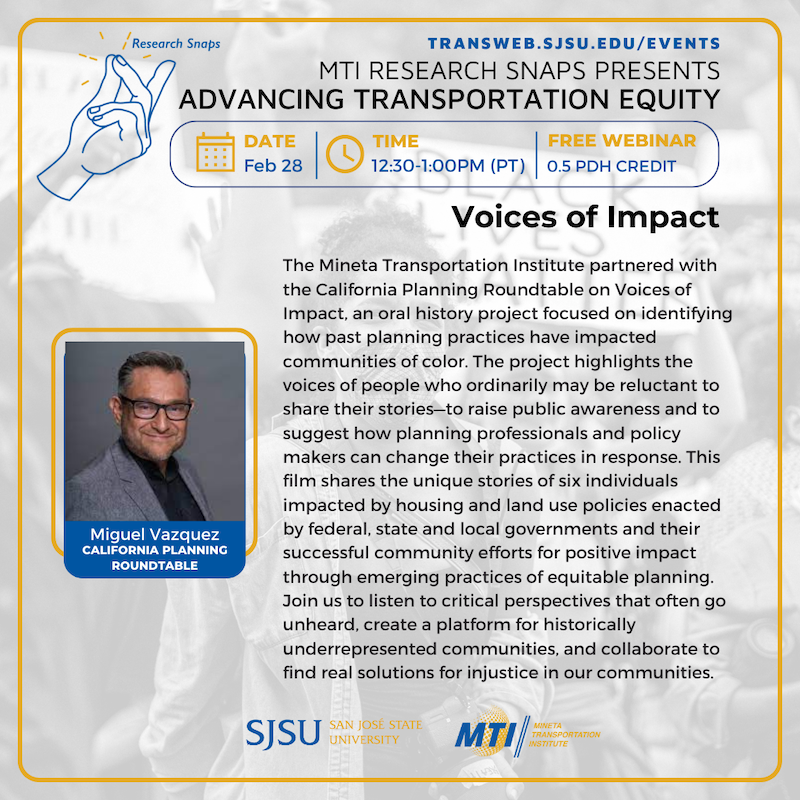 |
Voices of Impact - Online This webinar was the fourth part of MTI Research Snaps' Advancing Transportation Equity series. The Mineta Transportation Institute partnered with the California Planning Roundtable on Voices of Impact, an oral history project focused on identifying how past planning practices have impacted communities of color. The project highlights the voices of people who ordinarily may be reluctant to share their stories—to raise public awareness and to suggest how planning professionals and policy makers can change their practices in response. This film shares the unique stories of six individuals impacted by housing and land use policies enacted by federal, state and local governments and their successful community efforts for positive impact through emerging practices of equitable planning. This webinar shared critical perspectives that often go unheard, created a platform for historically underrepresented communities, and collaborated to find real solutions for injustice in our communities.
Read ED Blog about the Project
View RecordingView Slide DeckPDH CertificateDiscussion GuideAbout the PresenterMiguel Angel Vazquez, AICP, serves as the President of California Planning Roundtable. He is one of the first planners hired by a public health department in the nation. His role at the Riverside University Health System-Public Health is to strengthen the integration of planning and health through collaboration with non-traditional partners. The American Planning Association and affiliates have recognized his work and leadership with numerous awards, including the 2018 APA President’s Award and the 2020 APA California Distinguished Contribution Award. About the SeriesTransportation moves the world—impacting the lives of everyone, everywhere. Like many industries, transportation has dealt with its share of issues in equity. Transportation professionals work collaboratively to identify, analyze, and overcome inequities in the industry, acknowledging a sometimes-painful past to ensure that transportation policies serve all communities equitably This February, we hosted a 4-part MTI Research Snaps series on “Advancing Transportation Equity.” In this series, MTI researchers discussed transforming equity in transportation as we reflected on some of the most pressing issues of diversity and accessibility in the industry as a whole and how to overcome them. Webinars include:
|
||||||||||||||||||||||||||||||||||||||||||||||||||
February 21, 2023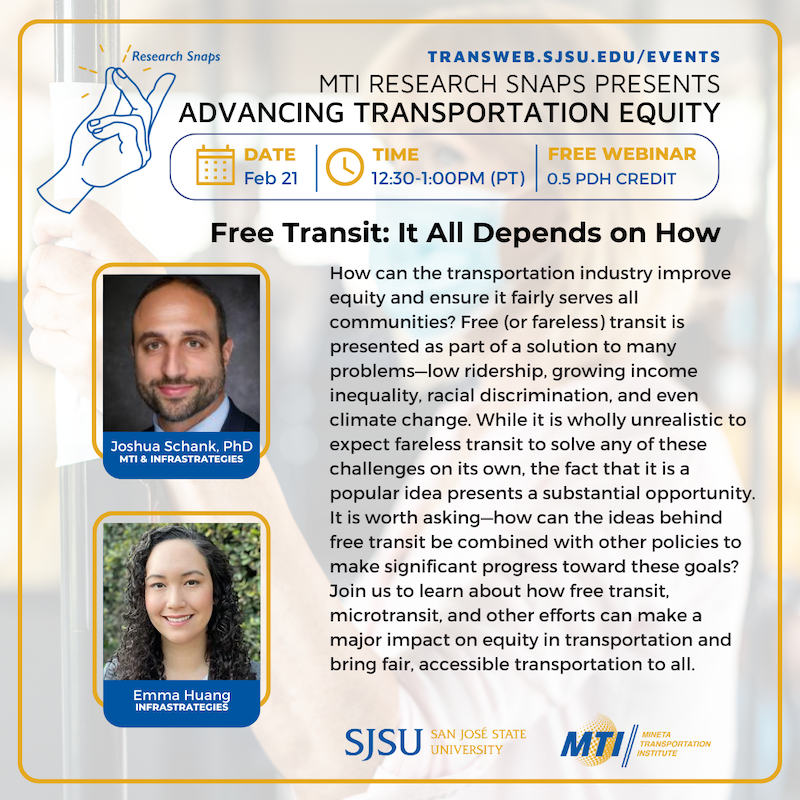 |
Free Transit: It All Depends on How - Online This webinar was the third part of MTI Research Snaps' Advancing Transportation Equity series. How can the transportation industry improve equity and ensure it fairly serves all communities? Free (or fareless) transit is presented as part of a solution to many problems—low ridership, growing income inequality, racial discrimination, and even climate change. While it is wholly unrealistic to expect fareless transit to solve any of these challenges on its own, the fact that it is a popular idea presents a substantial opportunity. It is worth asking—how can the ideas behind free transit be combined with other policies to make significant progress toward these goals? In this webinar, attendees learned about how free transit, microtransit, and other efforts could make a major impact on equity in transportation and bringing fair, accessible transportation to all. PDH CertificateView the RecordingView the SlidesRead the Presenters' Perspective PaperAbout the PresentersJoshua Schank holds a PhD in Urban Planning from Columbia University and a Master of City Planning from the Massachusetts Institute of Technology. He is a Research Associate at the Mineta Transportation Institute, a Managing Principal at InfraStrategies, and a Senior Fellow in the Institute for Transportation Studies at the University of California, Los Angeles. Dr. Schank previously served as Chief Innovation Officer of the Los Angeles County Metropolitan Transportation Authority (Metro), President and CEO of the Eno Center for Transportation, and Transportation Policy Advisor to Senator Hillary Clinton (D-NY). Emma Huang is a Senior Consultant with InfraStrategies LLC. Emma previously worked as a Transportation Planner in the Office of Extraordinary Innovation at LA Metro. She has a Master of Public Policy from the University of California, Los Angeles. About the SeriesTransportation moves the world—impacting the lives of everyone, everywhere. Like many industries, transportation has dealt with its share of issues in equity. Transportation professionals work collaboratively to identify, analyze, and overcome inequities in the industry, acknowledging a sometimes-painful past to ensure that transportation policies serve all communities equitably. This February, we hosted a 4-part MTI Research Snaps series on “Advancing Transportation Equity.” In this series, MTI researchers discussed transforming equity in transportation as we reflected on some of the most pressing issues of diversity and accessibility in the industry as a whole and how to overcome them. Webinars include:
|
||||||||||||||||||||||||||||||||||||||||||||||||||
February 14, 2023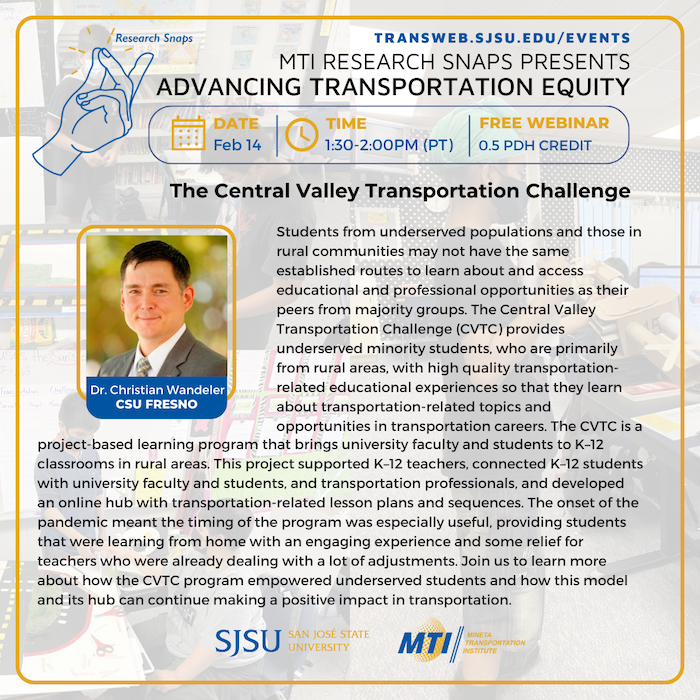 |
The Central Valley Transportation Challenge - Online This webinar was the second part of MTI Research Snaps' Advancing Transportation Equity series. Students from minority populations and those in rural communities may not have the same established routes to learn about and access educational and professional opportunities as their peers from majority groups. The Central Valley Transportation Challenge (CVTC) provides underserved minority students, who are primarily from rural areas, with high quality transportation-related educational experiences so that they learn about transportation-related topics and opportunities in transportation careers. The CVTC is a project-based learning program that brings university faculty and students to K–12 classrooms in rural areas. This project supported K–12 teachers, connected K–12 students with university faculty and students, and transportation professionals, and developed an online hub with transportation-related lesson plans and sequences. The onset of the pandemic meant the timing of the program was especially useful, providing students that were learning from home with an engaging learning experience and some relief for teachers who were already dealing with a lot of adjustments. In this webinar, attendees learned about how the CVTC program empowered underserved students and how this model and its hub can continue making a positive impact in transportation.
View the RecordingView the SlidesView Fresno State Transportation Institute's K-12 Resources
PDH CertificateAbout the PresenterDr. Christian Wandeler is an associate professor in research methods and statistics at California State University, Fresno. He has a Ph.D. in personality and positive psychology from the University of Zurich, Switzerland. His research interests are in the development of hope and learning achievement, project-based learning, and self-managing teams. He is currently researching the use of agile learning methods and design thinking in action civics projects. About the SeriesTransportation moves the world—impacting the lives of everyone, everywhere. Like many industries, transportation has dealt with its share of issues in equity. Transportation professionals work collaboratively to identify, analyze, and overcome inequities in the industry, acknowledging a sometimes-painful past to ensure that transportation policies serve all communities equitably. This February, we hosted a 4-part MTI Research Snaps series on “Advancing Transportation Equity.” In this series, MTI researchers discussed transforming equity in transportation as we reflected on some of the most pressing issues of diversity and accessibility in the industry as a whole and how to overcome them. Webinars include:
|
||||||||||||||||||||||||||||||||||||||||||||||||||
February 7, 2023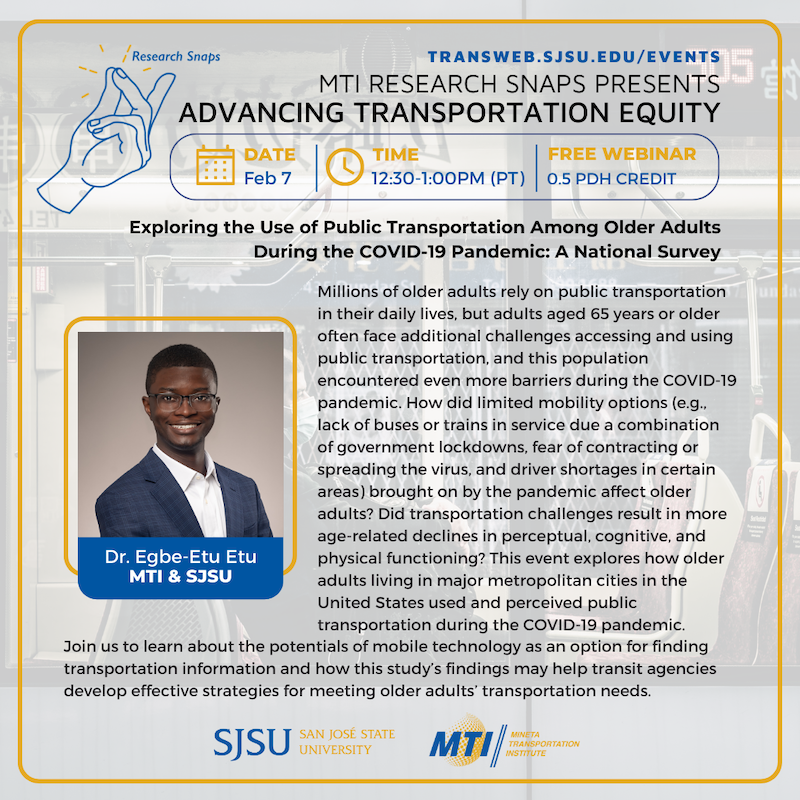 |
Exploring the Use of Public Transportation Among Older Adults During the COVID-19 Pandemic: A National Survey - Online This webinar was the first part of MTI Research Snaps' Advancing Transportation Equity series. Millions of older adults rely on public transportation in their daily lives, but adults aged 65 years or older often face additional challenges accessing and using public transportation, and this population encountered even more barriers during the COVID-19 pandemic. How did limited mobility options (e.g., lack of buses or trains in service due a combination of government lockdowns, fear of contracting or spreading the virus, and driver shortages in certain areas) brought on by the pandemic affect older adults? Did transportation challenges result in more age-related declines in perceptual, cognitive, and physical functioning? This event explored how older adults living in major metropolitan cities in the United States used and perceived public transportation during the COVID-19 pandemic. Attendees learned about the potentials of mobile technology as an option for finding transportation information and how this study’s findings may help transit agencies develop effective strategies for meeting older adults’ transportation needs. View RecordingPDH CertificateAbout the PresenterDr. Egbe-Etu Etu is an Assistant Professor of Business Analytics at San José State University (SJSU). He is also a Research Associate in the Mineta Transportation Institute. Before joining SJSU, Dr. Etu received his PhD in Industrial and Systems Engineering from Wayne State University in 2021 and his bachelor’s degree in Civil Engineering from Covenant University, Nigeria, in 2016. His research interests center on the development of use-inspired machine learning models to solve challenging business problems in healthcare, manufacturing, and transportation. He is a member of the Industrial Engineering and Operations Management (IEOM), Institute of Industrial & Systems Engineering (IISE), and SAVE International. About the SeriesTransportation moves the world—impacting the lives of everyone, everywhere. Like many industries, transportation has dealt with its share of issues in equity. Transportation professionals work collaboratively to identify, analyze, and overcome inequities in the industry, acknowledging a sometimes-painful past to ensure that transportation policies serve all communities equitably. This February, we hosted a 4-part MTI Research Snaps series on “Advancing Transportation Equity.” In this series, MTI researchers discussed transforming equity in transportation as we reflected on some of the most pressing issues of diversity and accessibility in the industry as a whole and how to overcome them. Webinars include:
|
||||||||||||||||||||||||||||||||||||||||||||||||||
December 6, 2022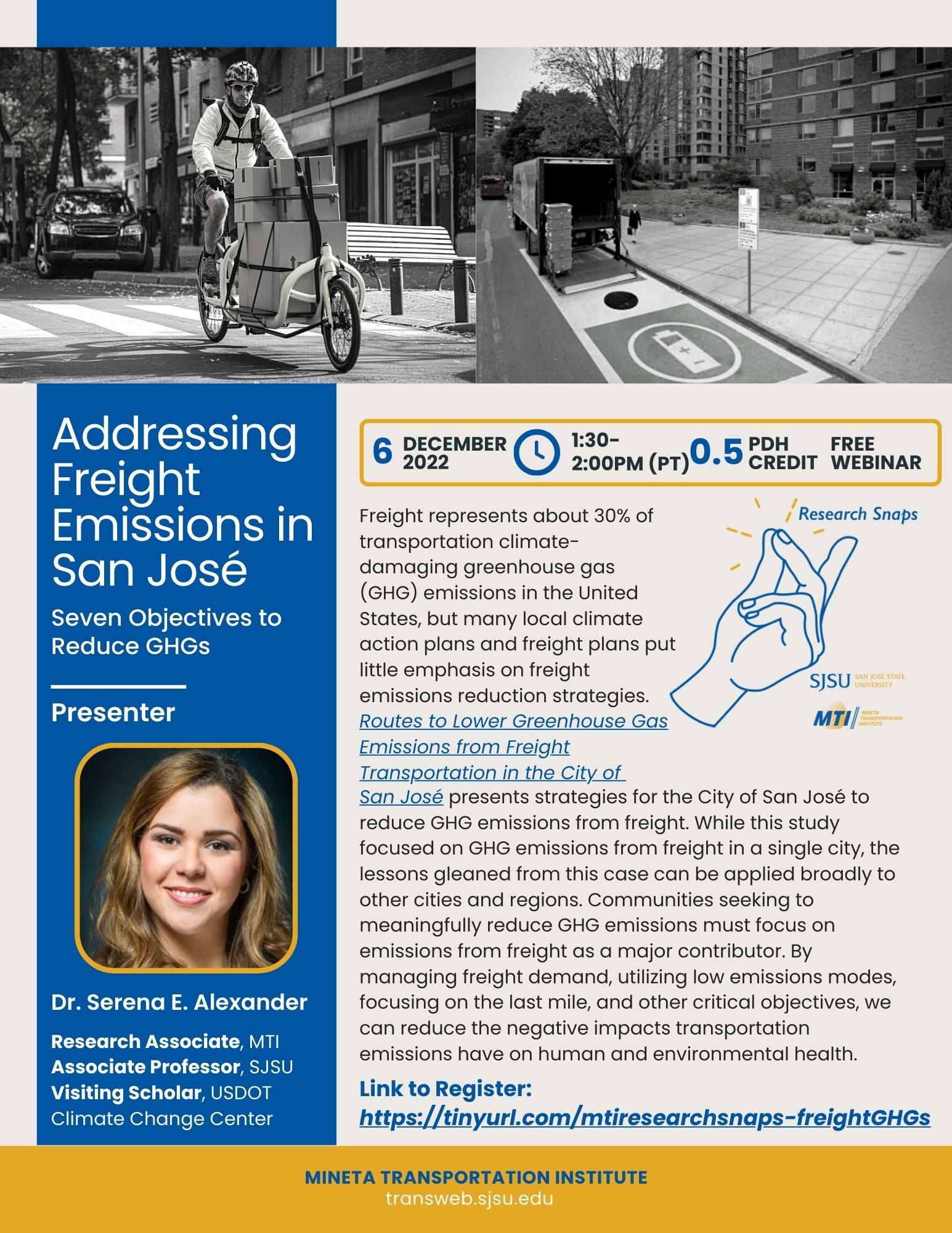 |
Addressing Freight Emissions in San José: Seven Objectives to Reduce GHGs - Online Freight represents about 30% of transportation climate-damaging greenhouse gas emissions in the United States, but many local climate action plans and freight plans put little emphasis on freight emissions reduction strategies. Routes to Lower Greenhouse Gas Emissions from Freight Transportation in the City of San José presents strategies for the City of San José to reduce GHG emissions from freight. While this study focused on GHG emissions from freight in a single city, the lessons gleaned from this case can be applied broadly to other cities and regions. Communities seeking to meaningfully reduce greenhouse gas emissions must focus on emissions from freight as a major contributor. By managing freight demand, utilizing low emissions modes, focusing on the last mile, and other critical objectives, we can reduce the negative impacts transportation emissions have on human and environmental health. About the PresenterDr. Serena E. Alexander is an MTI Research Associate and Associate Professor of Urban and Regional Planning and Director of Urban Online at San José State University. She is currently establishing the American Collegiate Schools of Planning (ACSP) and Association of European Schools of Planning (AESOP) collaboration platform to serve as a repository of best practices of climate action planning across the globe. She currently serves as Visiting Scholar at USDOT Climate Change Center. View SlidesView RecordingCM Credit CertificatePDH Certificate |
||||||||||||||||||||||||||||||||||||||||||||||||||
November 2, 2022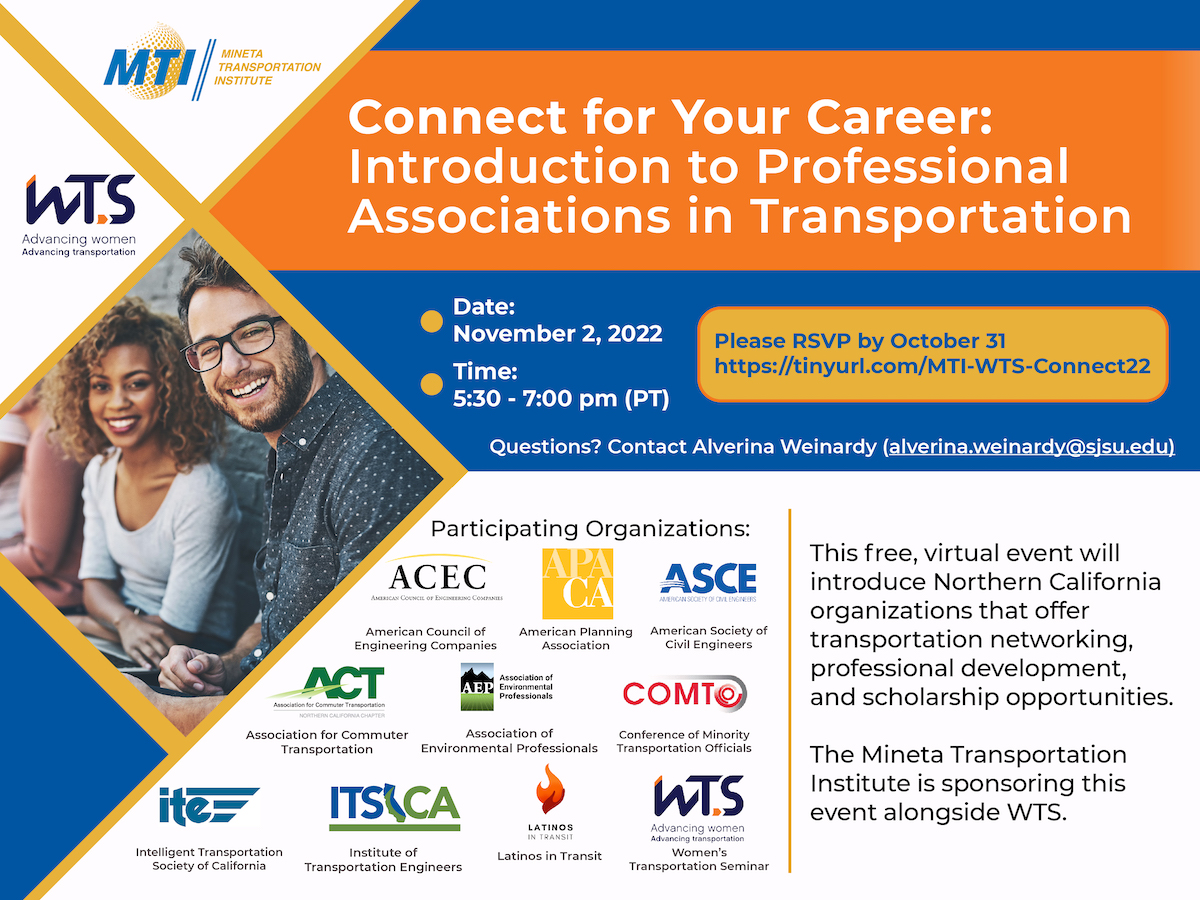 |
Connect for Your Career: An Introduction to Professional Associations in Transportation - Online WTS-SF Bay Area and the Mineta Transportation Institute (MTI) of San Jose State hosted this free virtual event "Connect for Your Career: An Introduction to Professional Associations in Transportation" that introduced university students and emerging professionals to Northern California transportation organizations that offer networking, professional development opportunities, and/or scholarship opportunities. Participating organizations include:
View Slides.View Recording. |
||||||||||||||||||||||||||||||||||||||||||||||||||
September 15, 2022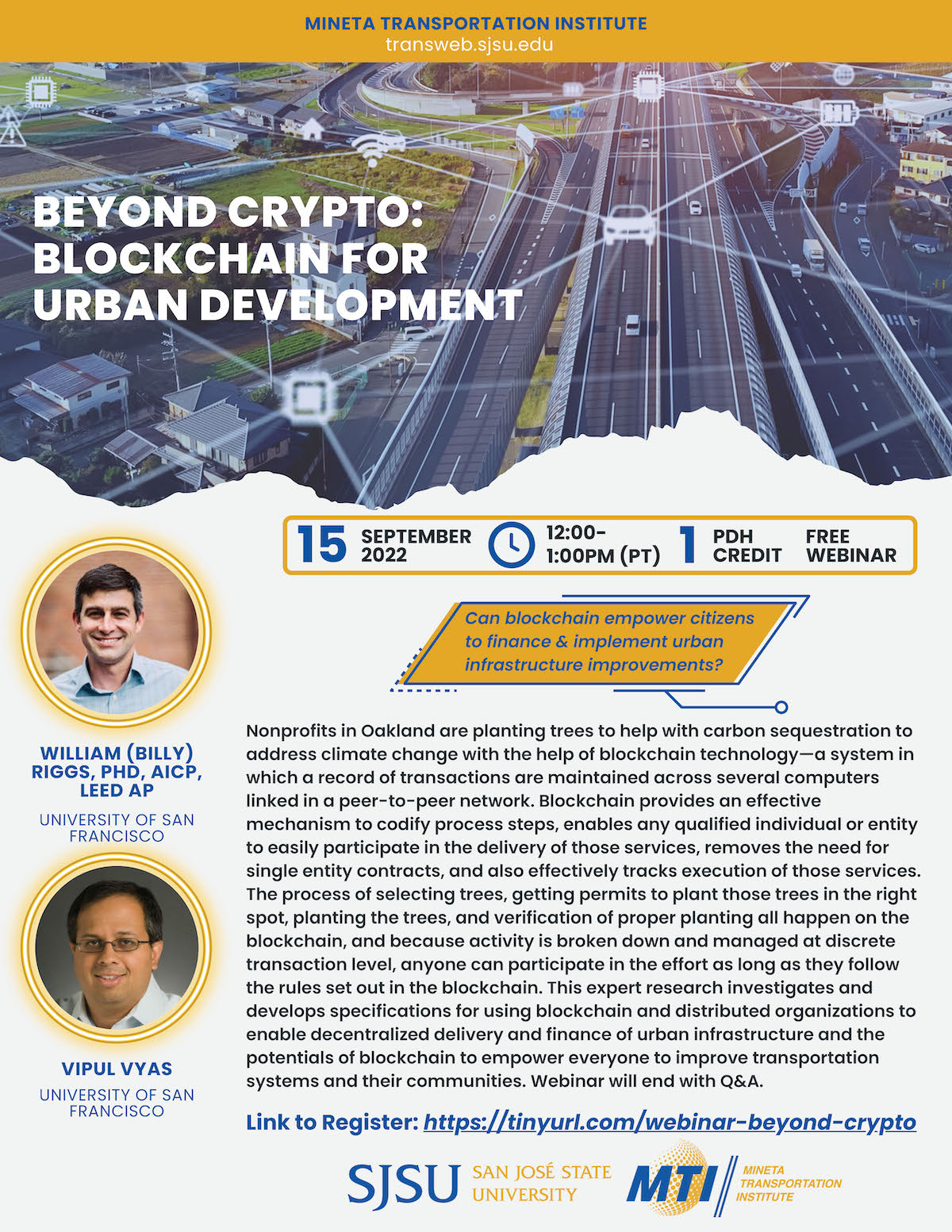 |
Beyond Crypto: Blockchain for Urban Development - Online Nonprofits in Oakland are planting trees to help with carbon sequestration to address climate change with the help of blockchain technology—a system in which a record of transactions are maintained across several computers linked in a peer-to-peer network. Blockchain provides an effective mechanism to codify process steps, enables any qualified individual or entity to easily participate in the delivery of those services, removes the need for single entity contracts, and also effectively tracks execution of those services. The process of selecting trees, getting permits to plant those trees in the right spot, planting the trees, and verification of proper planting all happen on the blockchain, and because activity is broken down and managed at discrete transaction level, anyone can participate in the effort as long as they follow the rules set out in the blockchain. This expert research investigates and develops specifications for using blockchain and distributed organizations to enable decentralized delivery and finance of urban infrastructure and the potentials of blockchain to empower everyone to improve transportation systems and their communities. Webinar also included Q&A with the project authors. CM Credit Certificate.PDH Credit Certificate.View Recording.View Slides. |
||||||||||||||||||||||||||||||||||||||||||||||||||
June 3, 2022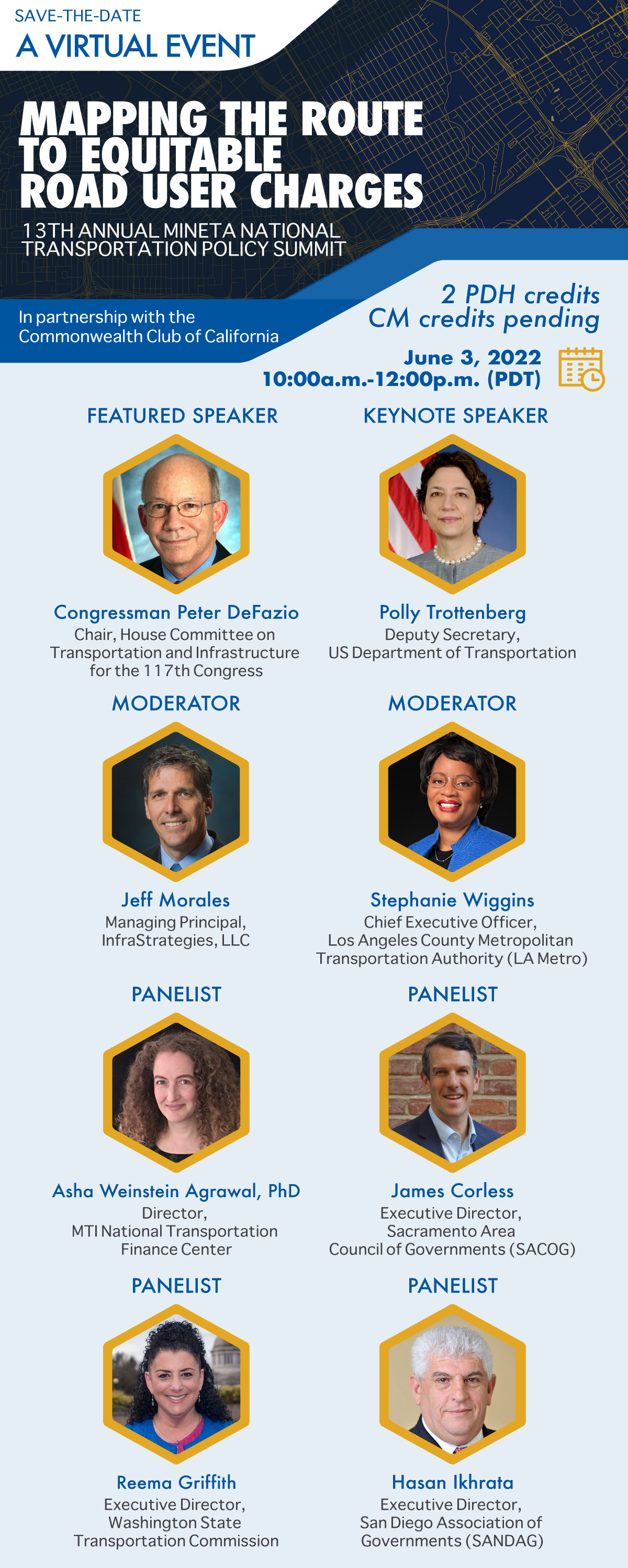 |
13th Annual Mineta National Transportation Policy Summit: Mapping the Route to Equitable Road User Charges The accelerating transition to electric vehicles brings new urgency to discussions on how to replace fuel taxes with other broad-based, reliable sources of transportation revenue. From Wyoming to Delaware to California, more and more state legislatures are considering mileage fees, regions like the San Francisco Bay Area are considering expanded tolling, and New York City is within reach of adopting a congestion pricing proposal. Overlaying these discussions is a persistent call to consider the equity of any new charges on drivers. How will the charges impact low-income drivers? Does payment require access to banking tools that are not universally available? This event explored proposals including fee rates that vary by driver income, vehicle characteristics, or time and place, and equity-centered policies for responding to non-payment of tolls or other fees. See here for more information and recordings from past events in the series. PDH CertificateView ProgramView RecordingSpeakers:
|
Pages
-
Contact Us
San José State University One Washington Square, San Jose, CA 95192 Phone: 408-924-7560 Email: mineta-institute@sjsu.edu

